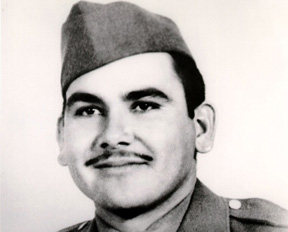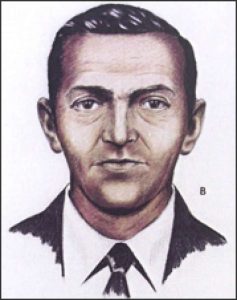
Private Felix E. Longoria from Three Rivers, Texas, was one of the soldiers who gave his life during World War II. Felix Longoria was drafted into the U.S. Army in 1944, and completed six weeks of basic training in Fort Ord, California with the 27th Infantry Regiment of the 25th Infantry Division. He was deployed to Luzon Island for his first combat assignment as an infantry man. He soon volunteered to join a patrol with orders to dislodge enemy snipers. Army Private Longoria was killed in 1945 at the age of 25 by a Japanese sniper and was awarded a Bronze Service Star, a Good Conduct Medal and a Combat Infantryman’s Badge.1 His remains were not recovered and identified until 1949 when they were returned to Three Rivers, Texas, his hometown.2
World War II, a global war, lasted from 1939 to 1945 and was the deadliest conflict in human history. The National WWII Museum reports over 500,000 Latinos (including 350,000 Mexican Americans and 53,000 Puerto Ricans) served in WWII. However, exact numbers are difficult to calculate because except for the 65th Infantry Regiment from Puerto Rico, Latinos were not segregated into their own units the way African Americans were.3 This article is not about World War II itself, instead it tells the story of one of our own Mexican American World War II Heroes from Texas. This affair shows how his community discriminated against him and his family after the war had ended despite his heroic military service for the US.
Three Rivers, Texas is a small town between Corpus Christi and San Antonio known for its hunting and fishing. In the early 1900’s, the main industries were a glass factory and a natural gas refinery. As most towns in the deep South, Three Rivers was ripe with racial segregation and discrimination. In South Texas in the 1940’s, Mexican Americans were treated as second class citizens despite many having their U.S. Citizenship. All were called Mexicans, they were turned away from local shops, swimming pools, and even banned from the barbershops. Signs were posted declaring, “No dogs, no blacks or Mexicans allowed” and “We serve whites only, no Spanish or Mexicans.”4 It was still a time when many Mexican women could only work as cleaning ladies, for Anglo families, sometimes getting paid as little as 15 cents for a day’s work. Mexicans were considered non-white despite being counted as whites on the census.5 World War II caused the nation to reexamine the laws. The Texas Legislator’s 1943 “Caucasian Race Resolution” granting Latin Americans status as “white” citizens notwithstanding.6 Thousands of Latino-American veterans returned from the war to find they were still second class citizens at home. The town of Three Rivers was no exception, Mexican Americans still lived on one side of the railroad tracks with Spanish street names and whites on the nicer side of the tracks.
Small towns were usually quick to acknowledge the death of American Heroes but not for Private Longoria’s. In mourning the death of her husband, Beatrice Longoria was to make arrangements for the wake service that she wanted to hold in their hometown. When she spoke to the Rice Funeral home, the only funeral home in town, the director, Tom Kennedy, declined to plan the service because he explained Felix Longoria was “Mexican” and because “the whites would not like it.”7 Mr. Kennedy was willing to set up a wake at the Longoria home as was the customary treatment of Mexican Americans by the Three Rivers community. Kennedy at one time was in the military, where he fought in Europe, suffered shrapnel wounds and was hospitalized until he went back to the United States. Therefore, it came as a surprise that Kennedy had no compassion for his fallen brother at arms.

Though Felix Longoria’s father had purchased a family plot on the Westside of the town where there was a fence that separated the Mexicans from the all-white burial plots, it was the service for the wake where the outrage began. All Beatrice Longoria wanted was for her husband’s service to be in his hometown with family and friends. Mr. Kennedy angered the Mexican-American community by not allowing the wake to be held at the funeral home. How was it that his ethnicity rather than his ultimate sacrifice for the country mattered more in determining whether he would received a proper burial with full honors. Hurt, confused, and in mourning, Beatrice’s sister Sarah Posas contacted Dr. Hector P. Garcia, a civil rights organizer. Dr. Garcia was no stranger to this type of discrimination so he agreed to help the Longoria family. Many time he was told, “You are not Americans, you are Mexicans” Dr. Garcia would respond by saying, “Well, we are American citizens of Mexican origin, so let’s point out to the people we are really Americans”.8 As a civil rights activist, he used his wartime skills to organize the community. He then contacted Senator Lyndon B. Johnson in Washington. Senator Johnson saw this as a national cause and took it all the way to the White House. The decision to bury Felix Longoria in a place other than Three Rivers became a collective demand for justice, dignity and equality. With collaborated work from Dr. Garcia and Senator Johnson, Felix Longoria’s remains were re-interred on February 16, 1949 in Arlington National Cemetery with full military honors.9 Dr. Garcia founded the American GI Forum in 1948 to help Military Veterans who needed assistance to receive the services and benefits they had earned as soldiers.
In 2010, Santiago Hernandez a resident from Corpus Christi gained permission from the funeral home owner to place a Texas Historical Marker on the property in memory of Felix Longoria. This came with some opposition from many white commission members, but the marker was placed. In 2014, under new management, the funeral home was demolished and converted into a parking lot. The original historical marker was allegedly hit by a driver who backed up into it and was removed. Santiago Hernandez later tried to convince the Three Rivers community to rename the local post office after Private Felix Longoria since the Texas Historical Marker had been damaged and not replaced. 10 Many community residents did not support the idea. Since the post office is a Federal building, renaming it requires a bill in the US Congress. Mr. Hernandez then contacted Congressman Lloyd Doggett who represented the Three Rivers area to inquire whether he would help change the name of the Post Office to honor Longoria. On July 22, 2004 Congressman Doggett proposed to the House of Representatives Bill 4911 that designated the United States Postal Service located in Three Rivers, Texas, as the “Private Felix Z. Longoria Veterans’ Memorial Post Office”.11

After all these years, the story about Felix Longoria, which became a catalyst for the American GI Forum and the spread of civil rights and pride among Mexican Americans is rarely spoken about in Three Rivers, Texas. Many residents still deny discrimination and segregation within the town were the motives. Talking to the townspeople many say, “This was never about race”.12 The discrimination against Felix Longoria remain unspoken when travelers from distant areas come to learn about where the Longoria Affair began. You would assume, given that a historical moment occurred in Three Rivers would be especially vigilant about anything involving the Longorias and the right for equality, but no one-including the mayor, the owner of the property who reportedly tore down the structure and members of the historical commission would speak about Felix Longoria. The Felix Longoria marker was replaced years later, it is now located on the city square in Three Rivers. 13

Some might ask why resurrect such memories and not just let the memory of Felix Longoria rest in Arlington National Cemetery alongside all other war heroes. This ghost of their past haunts the town and many would prefer to forget about it. However, communities must make amends for the many wounds inflicted by discrimination against the heroes who sacrificed their lives for the United States of America. The Historic Marker is but one small way to redress decades of open discrimination against Mexican American Veterans. This fight and ultimate victory that validates the full Citizenship rights of those born American and from Hispanic or Mexican ethnicity changed the lives of everyone in the town. Private Felix Longoria made history while alive in World War II and after his death continued to challenged discrimination in Three Rivers, Texas. While it may be a time in history some would rather not remember, the Longoria Affair sheds light, honor, and prestige forever on the Mexican American Community and the sacrifices of Gold Star families regardless of ethnicity.
- Patricia Portales, “An affair to Remember,” in San Antonio Current, august 11, 2010. ↵
- “Felix Longoria,” 1994-2011, Arlington National Cemetery, Website. www.arlingtoncemetery.net. ↵
- The National World War II Museum, Los Veteranos – Latinos in WWII, retrieve on 5/1/2020 from www.nationalww2museum.org . ↵
- Ruben Narrette Jr., “Navarette: Injustice for an American Veteran”, Press Democrat, November 10, 2010. ↵
- Ruben Narrette Jr., “Navarette: Injustice for an American Veteran”, Press Democrat, November 10, 2010. ↵
- Zachary Foust, “Caucasian Race Resolution’, July 9, 2019, Handbook of Texas Online, http://www.tshaonline.org/handbook/online/articles/mlc04. ↵
- Patricia Portales, “An affair to Remember,” in San Antonio Current, august 11, 2010. ↵
- Hector Garcia, interview, Mexican American Experience, July 9, 1969, hosted by David G. McComb, https://www.drhectorgarciafoundation.org. ↵
- Carroll, Patrick. Felix Longoria’s Wake, Publisher: The University of Texas Press, 2003. ↵
- John J. Valadez, The Longoria Affair. (2010) Boston: PB Distribution 2010. DVD. ↵
- R. 4911, July 22, 2004, 108th Congress 2 D Session. ↵
- Bob Richter, “Consider the other side of the ‘Longoria affair,'” San Antonio Express News, January 7, 2012. ↵
- Elaine Ayala, “Longoria marker to get new spot in Three Rivers,” San Antonio Express News 2015. ↵



92 comments
A'marie Pollard
It’s sad to see that people of color have to experience discrimination even when they are serving our country. I felt proud reading that a citizen from Corpus Christi felt that it was important to bring attention to Felix Longoria. I liked the article but I noticed that some of the pictures are missing. I would suggest fixing that so it looks more complete other than that I enjoyed the infographic.
Fernando Garza
This is an important article. When retelling Private Longoria’s story I felt proud for him and what he had accomplished. However, when hearing about the injustices his family and legacy faced, it disgusted me. This article shows us that it was not that long ago when the setting of society was set up much differently than it is now. Going back and seeing how its trend and its impact surpasses the ideas of respect and honor for people who served our country, reveals how important the protection of our values against discrimination is.
sbenavides11
It is truly unfortunate to see someone with the same background as many not be recognized for the sacrifices they have made. Especially one serving during a time of war. Understanding the culture that was accepted or normal back then is very odd to think about in today’s context. Individuals who served and were not white were still treated differently, even in a state of war. Very well put together and filled with lots of vital information.
jsanchez152
I have heard of the Longoria affairs before and always am happy to see more resources covering it. It serves well to show the extent at which prejudice corrupted society. At this time, a lot of the justification of prejudice came from the claim that Mexicans “weren’t American enough”, but even after Felix Longoria sacrificed his life for America he still was not American enough. What I was unaware of was that even despite national intervention, Three Rivers still resisted giving Longoria the respect he had earned. I agree with your implication that the sign was not damaged “accidentally”, especially after hearing that many members of the community denied to speak on it. To those who believe issues like this should be left in the past, acknowledging and remembering the past is the only way to assure it will not repeat itself.
ajuarez15
I really enjoyed this article, it is unfortunate that minorities have to face injustices for something to be done or changed. I heard about discrimination in restaurants, buses and so on, but I was not aware of the fences that were put to separate Mexicans from all the white burial plots. Felix Longoria fought for the injustices that Mexican Americans were facing, because of his affair he created a national civil right movement. As someone who was born in Mexico I feel very connected to this story, his determination really allowed Mexican Americans voices to be heard. It’s really nice to see how the author Lulu had the opportunity to visit such a historical place. It makes it even more meaningful to visit Felix Longoria’s Replaced Marker in Three Rivers Texas now that we know all the challenges that were faced to have that equality even after death.
mguerrero26
What a great article. I never knew about Felix Longoria, but now that I do he won’t be forgotten. It is shocking to hear that in the state where I currently live there was discrimination against my own people. If I had been born here about seven decades ago, I would have been discriminated against for having Mexican roots as Felix Longoria was. Nonetheless, I enjoyed reading this article. It was very engaging. Thank you for choosing this story. People must know and never forget Felix Longoria.
Haley Aleman
I am completely stunned after reading this. I have lived in San Antonio, Texas my whole life and have gone to and from Corpus Christi a number of times and I have never heard about Felix Longoria or the Longoria Affair. I amazes me that people would discriminate him in death but I was absolutely shocked to have read that individuals continued to disrespect his memory yeas after and as recent as 2014. I am simply unable to comprehend what emotions and values would allow someone to be so disrespectful towards another person’s memory, especially someone who gave the ultimate sacrifice for a country that seemed so adamant on discriminating against them at the time. We should forever be grateful for the sacrifices that Felix Longoria gave to our country during one of the worst political climates in history. Rest in power Felix E. Longoria.
arealyvasquez1
Coming from a border city with extensive influence on Mexican culture and customs, I have always taken a deep appreciation for those who seek to bring pride and support to Mexican Americans. In this case specifically, as the article mentioned, I cannot fathom how people cared more about someone’s ethnicity than the fact that they sacrificed their lives for the sake of the country. If giving their life in the midst of battle is not enough to consider them Americans, then we are failing them and their honor as heroes. It is noble and just to fight for the recognition of people like Felix Longoria even after their death because if we give up pursuing equality for all Americans after their passing then how are we able to guarantee it for the Americans of today and the future?
Ana Barrientos
First off, I liked how you put this article together and how informative it is. I have never heard of Private Felix E. Longoria and you did an excellent job telling his story. It breaks my heart that he couldn’t have a proper burial and be remembered because he was Mexican-American, his own family couldn’t grieve without facing backlash. I’m glad they keep persisting/pushing to get his name out there and his story heard.
dgutierrez41
A historic moment for the Mexican American community! I find the honoring of this brave solider and his story to echo into the civil rights movement as LULAC and other organization shared the same story that you are telling today. The in-depth interviews of residents in three rivers and their oppositions to a proper burial of a war hero showed the subtle but blunt racism that the Mexican American people faced even if it was not written in law they were not equal to their Anglo counterparts in society.